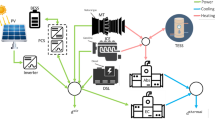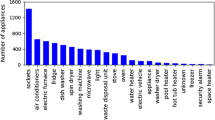Abstract
In this paper, the optimal operation problem of smart micro-grids integrated with the pricing of Time-of-Use (TOU) demand response (DR) program is modeled as a two-stage stochastic programming problem with the aim of minimizing the cost of MG operation and running TOU in the presence of renewable resources and incentive-based DR programs. Here, TOU as the most common type of time-based DR programs is implemented using a linear function based on the concept of self- and cross-price elasticity of load demand. In the presented model, the forecasting errors of generation of renewable resources are modeled by probability density functions. The operator of MG decides on two stages for optimal management of its network; the first stage refers to the operation of base condition of MG and the second one is pertaining to after the realization of different scenarios for generation of renewable resources. The base condition of MG refers to the situation in which the active power productions of renewables are equal to the predicted values. The proposed model is solved by Particle Swarm Optimization algorithm. A typical MG is employed to investigate and analyze the different features of the method. By varying the demand response potential of MG consumers, TOU tariffs are determined, and their impact on the results of energy and reserve cost as well as voltage and load profiles of MG are analyzed. Numerical results show the efficiency of DR in reducing costs as well as covering the uncertainty resulting from renewables.


















Similar content being viewed by others
References
Aghajani GR, Shayanfar HA, Shayeghi H (2015) Presenting a multi-objective generation scheduling model for pricing demand response rate in micro-grid energy management. Energy Convers Manag 106:308–321
Alavi SA, Ahmadian A, Aliakbar-Golkar M (2015) Optimal probabilistic energy management in a typical micro-grid based-on robust optimization and point estimate method. Energy Convers Manag 95:314–325
Bahramara S, Sheikhahmadi P, Golpîra H (2019) Co-optimization of energy and reserve in standalone micro-grid considering uncertainties. Energy 176:792–804
Basak P, Chowdhury S, Dey SHN, Chowdhury SP (2012) A literature review on integration of distributed energy resources in the perspective of control, protection and stability of microgrid. Renew Sustain Energy Rev 16:5545–5556
Bornapour M, Hooshmand R-A, Khodabakhshian A, Parastegari M (2017) Optimal stochastic coordinated scheduling of proton exchange membrane fuel cell-combined heat and power, wind and photovoltaic units in micro grids considering hydrogen storage. Appl Energy 202:308–322
Bouffard F, Galiana FD, Conejo AJ (2005) Market-clearing with stochastic security-part I: formulation. IEEE Trans Power Syst 20:1818–1826
Farzan F, Lahiri S, Kleinberg M, Gharieh K, Farzan F, Jafari M (2013) Microgrids for fun and profit: the economics of installation investments and operations. IEEE Power Energy Mag 11:52–58
Fathima AH, Palanisamy K (2015) Optimization in microgrids with hybrid energy systems: a review. Renew Sustain Energy Rev 45:431–446
Fattahi A, Nahavandi A, Jokarzadeh M (2018) A comprehensive reserve allocation method in a micro-grid considering renewable generation intermittency and demand side participation. Energy 155:678–689
Fossati JP, Galarza A, Martín-Villate A, Fontán L (2015) A method for optimal sizing energy storage systems for microgrids. Renew Energy 77:539–549
Gazijahani FS, Salehi J (2018) Integrated DR and reconfiguration scheduling for optimal operation of microgrids using Hong’s point estimate method. Int J Electr Power Energy Syst 99:481–492
Guerrero JM, Chandorkar M, Lee T, Loh PC (2013) Advanced control architectures for intelligent microgrids—part i: decentralized and hierarchical control. IEEE Trans Ind Electron 60:1254–1262
Hemmati R, Saboori H, Siano P (2017) Coordinated short-term scheduling and long-term expansion planning in microgrids incorporating renewable energy resources and energy storage systems. Energy 134:699–708
Huang Y, Wang L, Guo W, Kang Q, Wu Q (2018) Chance constrained optimization in a home energy management system. IEEE Trans Smart Grid 9:252–260
Izadbakhsh M, Gandomkar M, Rezvani A, Ahmadi A (2015) Short-term resource scheduling of a renewable energy based micro grid. Renew Energy 75:598–606
Jabbari-Sabet R, Moghaddas-Tafreshi S-M, Mirhoseini S-S (2016) Microgrid operation and management using probabilistic reconfiguration and unit commitment. Int J Electr Power Energy Syst 75:328–336
Jiang Q, Xue M, Geng G (2013) Energy management of microgrid in grid-connected and stand-alone modes. IEEE Trans Power Syst 28:3380–3389
Jimeno J, Anduaga J, Oyarzabal J, de Muro AG (2011) Architecture of a microgrid energy management system. Eur Trans Electr Power 21:1142–1158
Liao G-C (2012) Solve environmental economic dispatch of Smart MicroGrid containing distributed generation system—using chaotic quantum genetic algorithm. Int J Electr Power Energy Syst 43:779–787
Liu G, Tomsovic K (2012) Quantifying Spinning reserve in systems with significant wind power penetration. IEEE Trans Power Syst 27:2385–2393
Marzband M, Yousefnejad E, Sumper A, Domínguez-García JL (2016) Real time experimental implementation of optimum energy management system in standalone Microgrid by using multi-layer ant colony optimization. Int J Electr Power Energy Syst 75:265–274
Moghaddam AA, Seifi A, Niknam T, Pahlavani MRA (2011) Multi-objective operation management of a renewable MG (micro-grid) with back-up micro-turbine/fuel cell/battery hybrid power source. Energy 36:6490–6507
Moghaddam AA, Seifi A, Niknam T (2012) Multi-operation management of a typical micro-grids using particle swarm optimization: a comparative study. Renew Sustain Energy Rev 16:1268–1281
Mohammadi S, Soleymani S, Mozafari B (2014) Scenario-based stochastic operation management of microgrid including wind, photovoltaic, micro-turbine, fuel cell and energy storage devices. Int J Electr Power Energy Syst 54:525–535
Ortega-Vazquez MA, Kirschen DS (2009) Estimating the Spinning reserve requirements in systems with significant wind power generation penetration. IEEE Trans Power Syst 24:114–124
Partovi F, Nikzad M, Mozafari B, Ranjbar AM (2011) A stochastic security approach to energy and spinning reserve scheduling considering demand response program. Energy 36:3130–3137
Prodan I, Zio E (2014) A model predictive control framework for reliable microgrid energy management. Int J Electr Power Energy Syst 61:399–409
Roos A, Bolkesjø TF (2018) Value of demand flexibility on spot and reserve electricity markets in future power system with increased shares of variable renewable energy. Energy 144:207–217
Samimi A (2019) Probabilistic day-ahead simultaneous active/reactive power management in active distribution systems. J Mod Power Syst Clean Energy 7:1596–1607
Samimi A, Kazemi A (2016) Scenario-based stochastic programming for volt/var control in distribution systems with renewable energy sources. IETE Techn Rev 33:638–650
Sedighizadeh M, Mohammadpour AH, Alavi SMM (2019a) A two-stage optimal energy management by using ADP and HBB-BC algorithms for microgrids with renewable energy sources and storages. J Energy Storage 21:460–480
Sedighizadeh M, Esmaili M, Jamshidi A, Ghaderi M-H (2019b) Stochastic multi-objective economic-environmental energy and reserve scheduling of microgrids considering battery energy storage system. Int J Electr Power Energy Syst 106:1–16
Soroudi A, Amraee T (2013) Decision making under uncertainty in energy systems: state of the art. Renew Sustain Energy Rev 28:376–384
Su W, Wang J, Roh J (2014) Stochastic energy scheduling in microgrids with intermittent renewable energy resources. IEEE Trans Smart Grid 5:1876–1883
Talari S, Yazdaninejad M, Haghifam M (2015) Stochastic-based scheduling of the microgrid operation including wind turbines, photovoltaic cells, energy storages and responsive loads. IET Gen Transm Distrib 9:1498–1509
Wang F, Xu H, Xu T, Li K, Shafie-khah M, Catalão JPS (2017) The values of market-based demand response on improving power system reliability under extreme circumstances. Appl Energy 193:220–231
Wang D, Qiu J, Reedman L, Meng K, Lai LL (2018) Two-stage energy management for networked microgrids with high renewable penetration. Appl Energy 226:39–48
Weber J, Heinrichs HU, Gillessen B, Schumann D, Hörsch J, Brown T et al (2019) Counter-intuitive behaviour of energy system models under CO2 caps and prices. Energy 170:22–30
Xie S, Hu Z, Zhou D, Li Y, Kong S, Lin W et al (2018) Multi-objective active distribution networks expansion planning by scenario-based stochastic programming considering uncertain and random weight of network. Appl Energy 219:207–225
Zadsar M, Sebtahmadi SS, Kazemi M, Larimi SMM, Haghifam MR (2020) Two stage risk based decision making for operation of smart grid by optimal dynamic multi-microgrid. Int J Electr Power Energy Syst 118:105791
Zakariazadeh A, Jadid S, Siano P (2014a) Smart microgrid energy and reserve scheduling with demand response using stochastic optimization. Int J Electr Power Energy Syst 63:523–533
Zakariazadeh A, Jadid S, Siano P (2014b) Economic-environmental energy and reserve scheduling of smart distribution systems: a multiobjective mathematical programming approach. Energy Convers Manag 78:151–164
Zakariazadeh A, Jadid S, Siano P (2015) Integrated operation of electric vehicles and renewable generation in a smart distribution system. Energy Convers Manag 89:99–110
Zhang Y, Gatsis N, Giannakis GB (2013) Robust energy management for microgrids with high-penetration renewables. IEEE Trans Sustain Energy 4:944–953
Zhao B, Shi Y, Dong X, Luan W, Bornemann J (2014) Short-term operation scheduling in renewable-powered microgrids: a duality-based approach. IEEE Trans Sustain Energy 5:209–217
Author information
Authors and Affiliations
Corresponding author
Rights and permissions
About this article
Cite this article
Nikzad, M., Samimi, A. Integration of Optimal Time-of-Use Pricing in Stochastic Programming for Energy and Reserve Management in Smart Micro-grids. Iran J Sci Technol Trans Electr Eng 44, 1449–1466 (2020). https://doi.org/10.1007/s40998-020-00342-4
Received:
Accepted:
Published:
Issue Date:
DOI: https://doi.org/10.1007/s40998-020-00342-4




